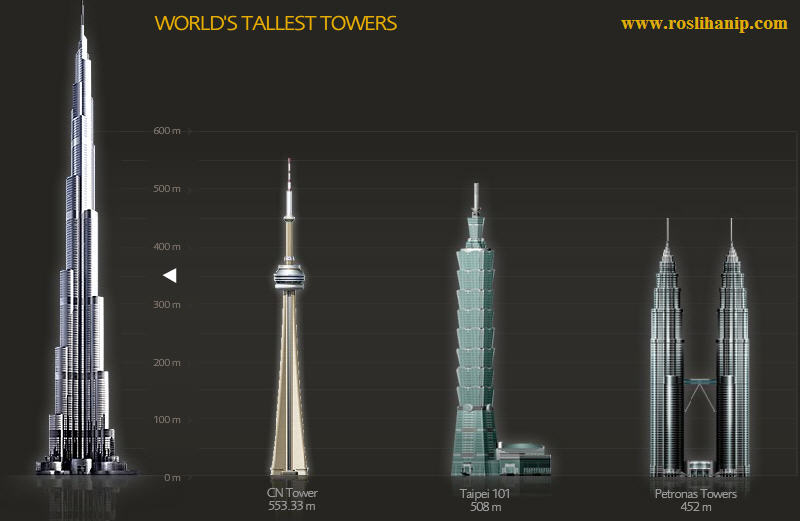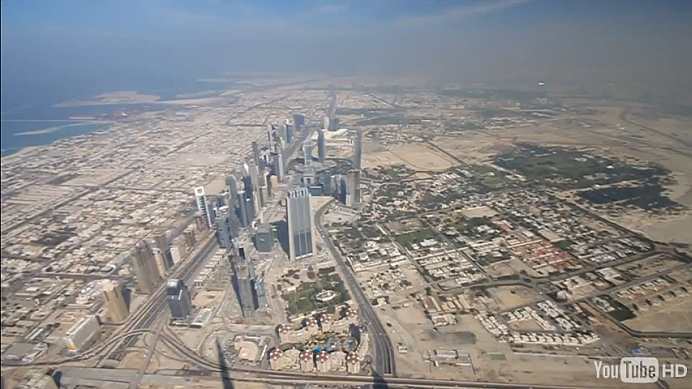 Dubai’s look is grand-scale. So is its debt. Its ambitions were colossal. It wanted to own the ‘largest hotel, largest airport, largest fake island and largest theme park in the world.’ The world’s tallest man-made structure ever built, fittingly renamed from Burj Dubai to Burj Khalifa after the leader of neighboring Abu Dhabi who just bailed Dubai out f a $10bn colossal debt, recently opened for business.
Dubai’s look is grand-scale. So is its debt. Its ambitions were colossal. It wanted to own the ‘largest hotel, largest airport, largest fake island and largest theme park in the world.’ The world’s tallest man-made structure ever built, fittingly renamed from Burj Dubai to Burj Khalifa after the leader of neighboring Abu Dhabi who just bailed Dubai out f a $10bn colossal debt, recently opened for business.Such is the story of magnificent Dubai. Grandiose look built on grandiose debt in the vicinity of $80 billion, largely incurred by Dubai World at 75 percent of total debt at the very least. Dubai World, the ‘enormous government-run investment company, which sports the slogan “The Sun Never Sets on Dubai World”’ fueled the country’s material ambitions. The government of Dubai was not able to bail out its own investment arm, and this sent shockwaves to global investors.
John Feffer in Foreign Policy in Focus excellently describes the collapse of Dubai World, and the dubious reputation Dubai itself has now earned: “A casino is an apt metaphor for the conglomerate’s operation. Dubai World was gambling with easy credit. It was dazzled by high-rolling investors. And it woke up the next morning with a hangover and empty pockets, hoping that its friends would help it out.”
Dubai has been largely living off the generous strength of others, and enjoying the ride all the way. Feffer adds that Dubai’s grand projects were “all built by migrant workers who were paid poorly, treated terribly and forbidden to strike.” The Burj Khalifa is a grand example of this. The tallest building in the world was built primarily by workers from South Asia. By June of 2008, there were 7,500 skilled workers constructing the Burj Khalifa.
Skilled carpenters earned a measly UK£4.34 a day, and laborers earned UK£2.84 at the site in 2006. According to a report by Human Rights Watch, ‘the workers were housed in abysmal conditions, their pay was often withheld, their passports were confiscated by their employers, and they were working in hazardous conditions that resulted in a high number of deaths and injuries on site.’ Also, “those workers toiled 12 hours a day, 6 days a week for pay as little as $4 per day.

Burj Khalifa (Arabic: برج خليفة "Khalifa Tower"), known as Burj Dubai prior to its inauguration, is a skyscraper in Dubai, United Arab Emirates, and is currently the tallest man-made structure ever built, at 828 m (2,717 ft). Construction began on 21 September 2004, with the exterior of the structure completed on 1 October 2009. The building officially opened on 4 January 2010, and is part of the new 2 km2 (490-acre) flagship development called Downtown Dubai at the 'First Interchange' along Sheikh Zayed Road, near Dubai's main business district.
The tower's architecture and engineering were performed by Skidmore, Owings and Merrill of Chicago, with Adrian Smith (now at his own firm) as chief architect, and Bill Baker as chief structural engineer. The primary contractor was Samsung C&T of South Korea.
The total cost for the project was about US $1.5 billion; and for the entire "Downtown Dubai" development, US $20 billion.[13] In March 2009, Mohamed Ali Alabbar, chairman of the project's developer, Emaar Properties, said office space pricing at Burj Khalifa reached US $4,000 per sq ft (over US $43,000 per m²) and the Armani Residences, also in Burj Khalifa, sold for US $3,500 per sq ft (over US $37,500 per m²).
The project's completion coincided with the global financial crisis of 2007–10, and with vast overbuilding in the country, led to high vacancies and foreclosures.[15] With Dubai mired in debt from its huge ambitions, the government was forced to seek multibillion dollar bailouts from its oil rich neighbor Abu Dhabi. Subsequently, in a surprise move at its opening ceremony, the tower was renamed Burj Khalifa, said to honour the UAE President Khalifa bin Zayed Al Nahyan for his crucial support.
Due to the slumping demand in Dubai's property market, the rents in the Burj Khalifa plummeted 40% some ten months after its opening. Out of 900 apartments in the tower around 825 were still empty at that time.

So what if you can’t beat the feat, just plan a look-a-like of the world’s tallest building. A few days after its first anniversary, the Burj Khalifa, is inspiring a similar structure in China.
The People’s Daily, in a report on Thursday, said the proposed $1.3 billion tower (the Burj cost an estimated $1.5 billion to build) would come up in Mentougou district of the capital and would house a seven-star hotel.
While not naming the developer, it said the project would be jointly developed with Saudi Arabia. The report quoted Wang Hongzhong, a senior official of the Mentougou district, as saying the design and planning of the seven-star hotel was ready. “It has been designed as a stream-lined building like the Khalifa Tower in Dubai,’’ the report quoted him as saying. The official did not mention the completion date of the venture, but said the hotel would be world-class and would bear the hallmark of luxury.
According to the report, the hotel would be located at the end of Chang An avenue, a road near Tiananmen Square.
China has been on a skyscraper construction spree as other countries put such plans in the cooler during the downturn.
The 600-metre Canton Tower, which was completed in late September, ahead of the Asian Games, has been the latest to join the race for the heights.
Shanghai also plans to complete a 121-floor tall building by 2014, which is set to overtake the Canton Tower .
But, for the moment, the Burj Khalifa towers over the wannabes and the rest at over 828 metres (2,716.5 feet) with more than 160 storeys. It sure looks good to stay that way for a long time.
While not naming the developer, it said the project would be jointly developed with Saudi Arabia. The report quoted Wang Hongzhong, a senior official of the Mentougou district, as saying the design and planning of the seven-star hotel was ready. “It has been designed as a stream-lined building like the Khalifa Tower in Dubai,’’ the report quoted him as saying. The official did not mention the completion date of the venture, but said the hotel would be world-class and would bear the hallmark of luxury.
According to the report, the hotel would be located at the end of Chang An avenue, a road near Tiananmen Square.
China has been on a skyscraper construction spree as other countries put such plans in the cooler during the downturn.
The 600-metre Canton Tower, which was completed in late September, ahead of the Asian Games, has been the latest to join the race for the heights.
Shanghai also plans to complete a 121-floor tall building by 2014, which is set to overtake the Canton Tower .
But, for the moment, the Burj Khalifa towers over the wannabes and the rest at over 828 metres (2,716.5 feet) with more than 160 storeys. It sure looks good to stay that way for a long time.




No comments:
Post a Comment